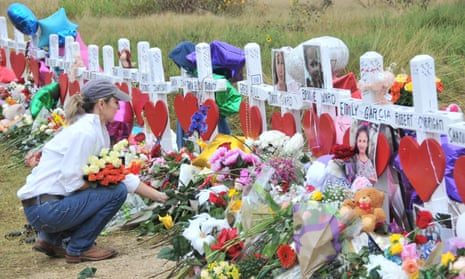The Sunday before last, a convicted domestic abuser used an illegally obtained AR-15 semi-automatic rifle to murder 25 parishioners worshipping at the First Baptist church of Sutherland Springs, Texas.
The Sutherland Springs shooter was far from the first killer to have a history of domestic violence. According to a July report by the Centers for Disease Control and Prevention, more than half of female homicide victims are murdered by their intimate partners. Women are five times more likely to die as a result of domestic violence when there is a gun in the home.
The correlation between the presence of a gun and the loss of a life in domestic disputes is undeniable. Guns turn dangerous disputes into deadly ones, and there are commonsense steps Congress can take today to save lives.
The federal background check program can prevent the sale of firearms to people who are a danger to themselves or others. But the program is only as good as the information that is provided to it – a tragic truth we have seen far too many times, including in my own state of Connecticut.
The Sutherland Springs shooter had been convicted in military court of assaulting his then wife and her child. He had served a year in a military prison. And, although current federal law prohibits convicted domestic abusers from purchasing or possessing a firearm, Devin Patrick Kelley was able to purchase at least four guns from federally licensed dealers before carrying out his horrific crime. The reason: the military failed to notify the background check database of the killer’s domestic violence assault.
In 2014, Connecticut mother Lori Jackson was shot and killed by her estranged husband, who had legally obtained a handgun while subject to a temporary restraining order. In that moment when Lori Jackson was most vulnerable, laws protecting her were the weakest. The very next day, that temporary order would have become permanent and he would have been barred from purchasing that gun.
In October, I introduced the Lori Jackson Domestic Violence Survivor Protection Act to close the gaping loophole that permits intimate partners to retain access to firearms, even when they are under court restraining orders. There is no reason we should fail to protect women when they are protected by a temporary restraining order preceding a permanent restraining order. Extending that ban to include temporary restraining orders could be the difference between life and death.
This bill is a narrowly crafted, commonsense measure that would be a step toward preventing another death like Lori Jackson’s, or another community torn apart, like Sutherland Springs.
I am frequently asked how I can continue to hope for passage of any gun control measure, when Congress seems paralyzed by inaction, in the grip of the gun lobby. But Congress has acted before. Twelve years after James Brady was shot and crippled, and Ronald Reagan was almost assassinated, Congress passed the Brady Bill. In the end, voices of millions of Americans in support of commonsense solutions outweighed the millions of dollars spent by the gun lobby.
Now, I believe, America is reaching a similar tipping point. Communities across the country are calling on Congress to cease its complicity in the continued, senseless deaths of Americans. Enough is enough. It is time to honor victims of gun violence with action – focused not on the last mass shooting or individual tragedies, but on preventing future deaths.
